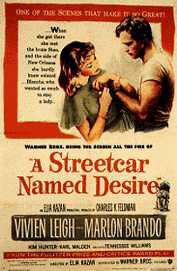In Remembrance: Elia Kazan
 Elia Kazan, the Oscar winning director of On The Waterfront and
Gentleman's Agreement and director of A Street Car Named Desire
passed away on Saturday, September 27, 2003.
He was 94.
Elia Kazan, the Oscar winning director of On The Waterfront and
Gentleman's Agreement and director of A Street Car Named Desire
passed away on Saturday, September 27, 2003.
He was 94.
Born Elia Kazanjoglous on September 7, 1909 in Constantinople, Kazanís family immigrated to New York when he was 4. After attending school in New York City and New Rochelle he went to Williams College, graduating cum laude. He then went on to two years of study at Yale Universityís Drama School. At the same time he also joined the Group Theater in New York as an actor and assistant stage manager, appearing in a dozen plays.
Kazan began directing plays in 1935 and earned his first big critical notices in 1942 for the comedy Cafť Crown. He had a huge box office hit later that year with Thornton Wilderís The Skin Of Our Teeth starring Tallulah Bankhead, Florence Eldridge, Frederic March and Montgomery Clift and earned him his first New York Drama Criticsí Circle Award for his direction. In 1947, he joined with Cheryl Crawford and Robert Lewis to found the Actors Studio. He also directed two hit plays- Arthur Millerís Death of a Salesman with Lee J. Cobb and Tennessee Williamsí Streetcar Named Desire featuring newcomer Marlon Brando.
It was through his numerous stage work that Kazan became adept at directing his film casts to great performances. Over the span of his film career Kazan has directed his performers to 21 Academy Award nominations, nine of which would go on to win Oscars.
Kazan directed his first film in 1937, the forgettable The People of the Cumberland. His first major film was 1945ís A Tree Grows In Brooklyn, which won a best supporting actor Oscar for James Dunn.
Many of his films would deal with controversial social issues. In 1947, he directed Gregory Peck in Gentlemanís Agreement, a searing indictment of institutionalized anti-Semitism. 1949ís Pinky dealt with racism and miscegenation. He examined the idea of media and celebrity in 1957ís A Face In The Crowd with Andy Griffith.
Kazan was also known for giving many actors their first major roles
including James Dean (East of Eden, 1956), Warren Beatty (Splendor
In The Grass, 1961), Jack Palance (Panic In The Streets, 1950)
and Lee Remick (Wild River, 1960).
His greatest achievement was his 1951 film adaptation of A Streetcar Named Desire. In addition to making Marlon Brando a star, the film was nominated for 12 Academy Awards, nabbing four. His 1954 film On The Waterfront would also garner 12 Academy Award nominations winning eight.
For many though, Kazanís achievements will be forever shadowed by his decision to cooperate with the House Un-American Activities Committee in 1952 when he acknowledged that he had been a member of the Communist Party from 1934 to 1936 and gave the committee the names of eight other party members. In On The Waterfront, Marlon Brandoís character is called before a commission investigating union corruption and informs on both friends and enemies. Many saw the film, written by novelist Budd Schulberg who had also named names to the congressional committee, as a way for the writer and director to defend their actions.